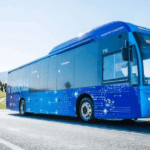EV Fleet
Vehicle fleets that run on petrol or diesel fuel are among most significant factors behind the current climate crisis. That’s why governments and companies around the world are taking steps to limit the carbon emissions produced by fleet vehicles such as buses and cargo trucks.
The rise of electric vehicles represents an enormous opportunity. Fleet electrification is an increasingly popular solution for corporations as well as local and national governments. The electric bus market alone is projected to grow from 112,000 units in 2022 to over 671,000 units in 2027.
Transitioning to an EV fleet has the effect of dramatically reducing your organisation’s carbon footprint. Moreover, when done properly, it will boost efficiency and sustainability while ultimately bringing down total cost of ownership.
We at Evenergi are experts at helping you secure the financial and environmental advantages of fleet electrification. From planning and procurement to optimisation and long term management, we provide you with the data based insights you need to identify opportunities and capitalize on them. Our services simplify the decision making process, preventing costly mistakes and limiting overall risk.
EV Buses
Bus fleets—whether commercial or municipal fleets—are obvious candidates for electrification. In addition to harming the environment, their substantial tailpipe emissions pose a direct threat to public health by polluting the air we breathe. They also contribute to noise pollution.
The potential upside of bus fleet electrification is immense. With that said, EV transition is generally complex, and buses are no exception. It involves numerous variables that must be individually understood before being integrated into a broader transition framework.
Beyond selecting and procuring zero emissions vehicles, bus operators must factor in things like:
- Charging infrastructure
- Depot configurations
- Electricity capacity
- Battery management
- Battery range
- Route optimisation
- Driver upskilling
- Upfront costs
With regard to charging infrastructure, two options exist: depot based charging and on route charging. In the case of depot based charging, vehicles are recharged on-site overnight. With on route charging, vehicles are recharged via designated charging stations along the route.
Depending on the specifics of your network and operational environment, one option may be clearly preferable to the other. In some cases, a hybrid model could be the optimal solution.
Regarding upfront costs, it’s important to note that EV buses have a high purchase price relative to diesel buses. They are also heavier due to the weight of the battery, which decreases passenger capacity. Evenergi will help you develop comprehensive costing models to arrive at an accurate overall price.
EV Fleets for Logistics
Operators of long haul freight trucks and other heavy transport vehicles stand to gain just as much from fleet electrification—especially as the demand for logistics services continues to go up.
As with buses, diesel trucks are a major source of the transport sector’s carbon footprint. Transitioning to EV truck fleets will sharply curtail tailpipe emissions which in turn has a favorable effect on air quality, noise pollution, and public health.
While planning an EV transition, truck fleet operators must consider many of the same factors as bus fleet operators. That means extensive modeling to account for charging infrastructure (depot vs on route), route optimisation, driver upskilling, total cost of ownership, and more.
That said, complexity is heightened by the fact that freight vehicle fleets have substantially higher energy requirements than buses. This presents specific challenges, although new developments in battery technology are making the job of powering electric trucks easier and more cost effective.
Evenergi is here to make your zero emissions vision a reality. Armed with insights generated by our sophisticated software programs, you can plan, adopt, and optimise an EV fleet with minimal risk and maximal reward.

 EV Fleet for Bus Operators
EV Fleet for Bus Operators EV Fleet for the Logistics Industry
EV Fleet for the Logistics Industry An introduction to electric road freight vehicles
An introduction to electric road freight vehicles King County Metro
King County Metro